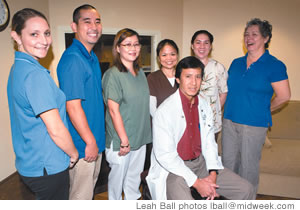Caring For Our Kupuna
Interviewed by Melissa Moniz
Wednesday - December 09, 2009
E-mail this story | Print this page | Comments (0) | Archive
 Del.icio.us Share
Del.icio.us Share

Dr. Eric Yee
Medical director of Hi’olani Care Center-Kahala Nui, family medicine and geriatrics
Can you discuss the services offered by Kahala Nui?
Kahala Nui is a continuing care retirement community that has 475 residents: 270 units are for independent living, 41 are for assisted living, 22 are for memory-support patients and 60 are for those receiving nursing care. Kahala Nui offers residents a continuum of care for those who are fully independent to those who need 24-hour attention. All residents enjoy a diverse set of activities designed to keep them active and engaged. There also is an active volunteer program that allows independent-living residents to volunteer their time to help residents in nursing care.
Do you see changes as far as the care needed and recommended for our elderly?
Yes, we have a rapidly growing elderly population, and some of the biggest needs we see are for socialization, safety and the ability to access services. Currently, about one in five people in Hawaii is over the age of 65, and it is projected that in 20 years it will be one in four. Families are getting smaller, and the younger generation is much more mobile, so they often are living elsewhere. That makes it much more difficult for mom and pop to be cared for because everyone has their lives and careers. This is the big social problem that is already here. Paradoxically, we’re seeing a drop in primary care physicians and geriatricians at time when we have nearly 75 million baby boomers coming through the pipeline, so there’s going to be a tipping point. There really are not enough nursing facilities for our kupuna, so we need to find creative ways to extend more care into the home setting and encourage more physicians to assist with the care of our elders.
Would you say that affordability is the biggest factor in opting to stay in a nursing/senior care facility?
Yes, I think affordability is a huge challenge. Cost of care continues to rise and can vary greatly depending on the level of care needed. But regardless of the cost there simply are not enough spaces for people who want or need senior care.

|
Can you talk about what commonly happens to the body as it ages?
As the body ages, frailty is clearly one of the leading occurrences. People start to slow down, and falls become prevalent. Often, memory starts to falter and they may become confused or demented. They may have less endurance, more stiffness and muscle weakness. Additionally, bones get thinner, and hormone and vita-min levels decline. Social isolation may result in depression and anxiety, and they may also lack socialization and become more isolated.
Is it usually the mind or the body that starts to decline first?
That’s difficult to say. A lot of the consults I do are because of a decline in cognition, but they are really intertwined. When the mind goes, the body goes, and when the body goes, the mind goes. Exercise and good nutrition can help maintain and prolong a healthy body and mind.
What can be done in the younger years to prevent problems that occur as we age?
What we do know is that the higher your educational level - not necessarily by degrees, but how much you “load on your hard drive” in your younger years - gives you a certain amount of gas in the tank. So if you get a hole in the tank later in life and you have a whole lot more to start with, then you can function at a higher level for longer. I’m a strong advocate for learning and exercise. If you keep your body in shape, your mind will stay in shape and vice versa. Establishing good, regular exercise routines early in life will serve you better in later years. Good nutrition, eating well and avoiding smoking and too much alcohol are also keys to achieving long-term health. We have one body, or one “car,” to drive around in life, so how you treat it will determine how well and how long it runs.
E-mail this story | Print this page | Comments (0) | Archive
Most Recent Comment(s):













